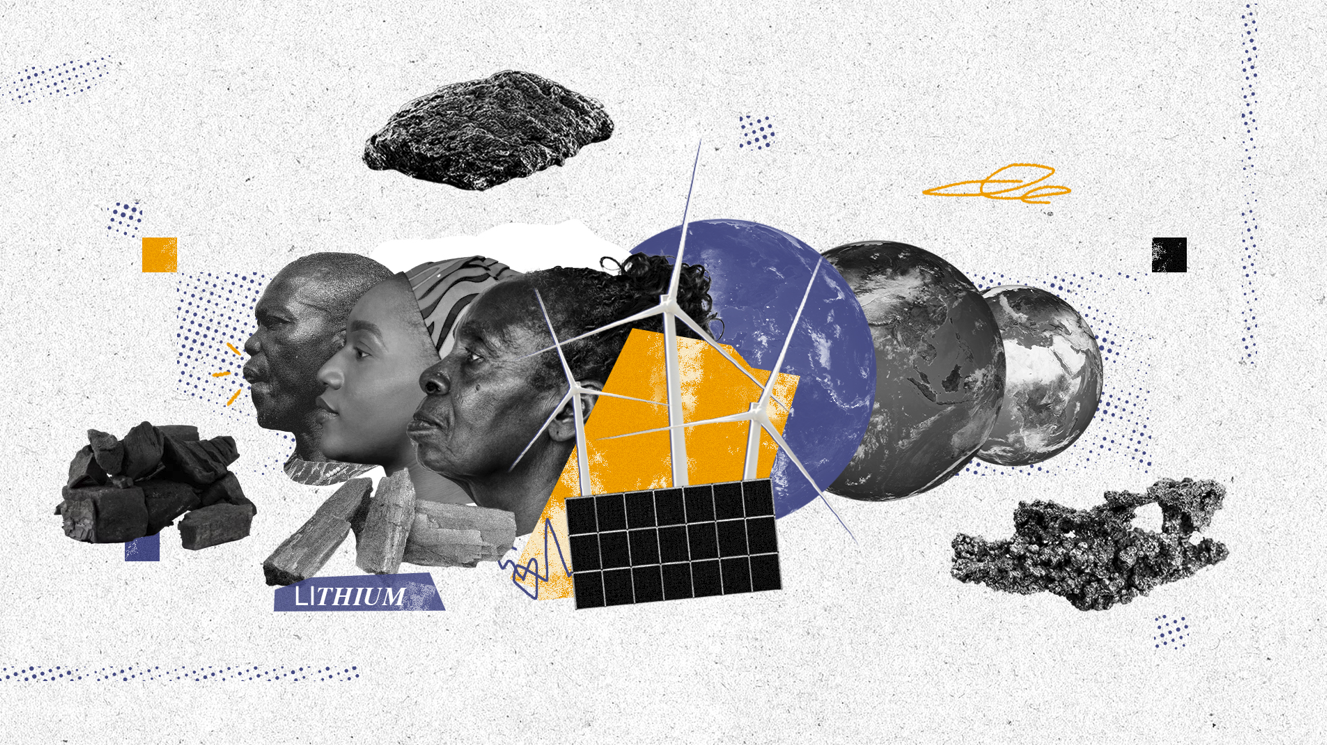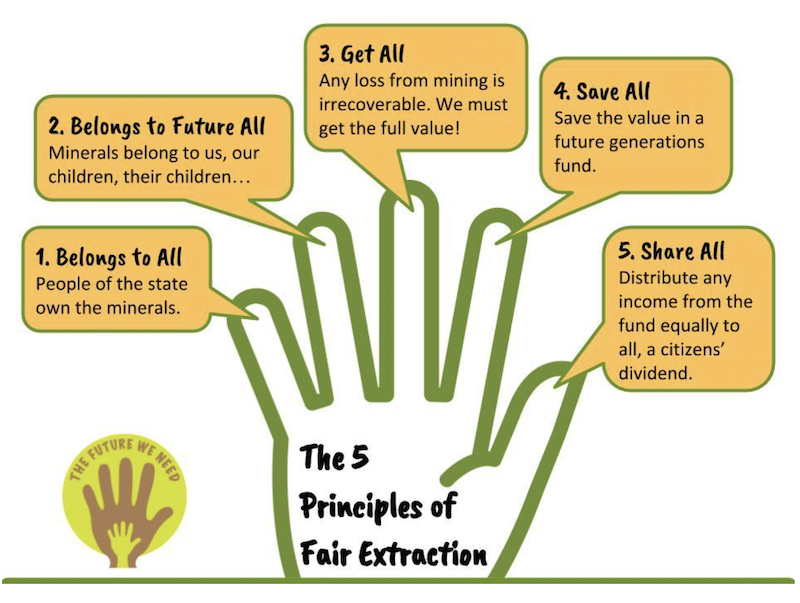To make the most of the transition minerals boom, African leaders need to come together and act urgently to ensure that the emerging transition minerals market is well-regulated, transparent, just and equitable.
The world needs to stop burning fossil fuels. Climate change is already happening and to prevent the worst impacts we must accelerate the just transition to cleaner, safer energy.
In moving to renewable energy technologies, the world will be swapping reliance on one set of natural resources for another. An estimated sixfold increase in the production of minerals such as cobalt, lithium, nickel and copper will be required to help produce, transport, store and use electricity produced by cleaner sources such as wind, water and sun.
The African continent is home to a wide variety of those much needed minerals. 19% of the global reserves of metals required to make a standard battery-powered electric vehicle are in Africa. The Democratic Republic of Congo alone is estimated to own 60% of the world’s cobalt reserves. Zambia is ranked the world seventh largest copper producer, Zimbabwe is the sixth producer of lithium and Madagascar and Mozambique have significant graphite deposits.
If used well, the revenues from transition minerals extraction could be the springboard to developing African countries.
But the extraction of minerals in Africa is already beset by corruption, opacity, environmental damages and human rights abuses. Mining often takes place at great cost to the health and livelihoods of local people. Research indicates that African women and girls are disproportionately harmed by mining, as well as local communities on the front lines and workers in the artisanal and small-scale mining sectors.
Secret deals impacting entire populations are made between companies and governments with no possibility for citizens to scrutinise and participate in decision making. As a result, revenues from extraction often benefit a limited circle of people and don’t translate into improved livelihood for African populations. Illicit financial flows are plaguing countries’ budgets, with huge amounts of capital being captured by political and business elites and massively leaving the continent.
Fierce competition, demand and pursuit of profit in the transition mineral rush will increase pressure on African producing countries to “fast-track” licensing and open up mining in sensitive and high risk areas. This leaves the process open to corruption and worsens human rights and environmental abuses, in particular pollution and contamination of water and land gravely affecting the health of workers and surrounding populations.
Africa is also facing the challenge of seeing most of its critical minerals leaving the continent to be processed elsewhere. African countries often lack the technical knowledge to ensure the whole supply chain. Mining companies also don’t always invest into local staff and goods, depriving African countries from well needed potential revenues from extractive activities.
Mining for transition minerals which is marred by poor governance, corruption, overconsumption and little care for people and the environment will only repeat the exploitation and injustices of the past, and put the African continent at greater risk of deepened poverty and instability, as well as increased human rights abuses and environmental damage.
African leaders need to come together and act urgently to ensure that the emerging transition minerals market is well-regulated, transparent, just and equitable. This requires a coordinated effort to transform the way minerals are extracted, processed and consumed, putting African populations – and local communities in particular – at the centre of any decision that impacts them.
To ensure responsible extraction, sourcing and processing of transition minerals that contribute to a successful energy transition in Africa, governments, companies, international institutions and investors must:
Centre people & planet:
- Base any decision related to extraction on a holistic assessment of the true costs and benefits of minerals extraction and processing. This goes beyond mineral sales proceeds, to look at the impact on people, the environment, biodiversity and the climate through objective and in-depth social and economic studies and surveys; including direct and inclusive consultations of people and communities affected on the ground.
- Ensure meaningful and inclusive consultation and participation for all communities directly or indirectly affected by mining. The obligation to obtain Indigenous peoples’ Free, Prior and Informed Consent must be prioritised and respected, as aligned with the UN Declaration on the Rights of Indigenous Peoples. Their right to give or withhold consent must be guaranteed at all stages of extraction.
- Only extract minerals in line with the most rigorous international human rights and environmental standards through meaningful, transparent and gender-responsive mandatory human rights and environmental due diligence.
- Regulate and monitor the artisanal and small-scale mining sector, in order to protect workers from human rights abuses and to counter corruption.
- Guarantee effective, independent monitoring of grievance mechanism, mitigation, and corrective measures established by mining companies.
- Respect mining-exclusion zones to protect people, their culture and the environment in high risk areas.
- Support a global moratorium on deep sea mining until adequate scientific research is undertaken to understand the impacts on deep sea biodiversity, and ensure decision-making at international level – including by the International Seabed Authority, is transparent, accountable, inclusive and participatory.
- Develop and prioritise mining approaches that minimise social, environmental and climate impacts. This includes cooperating to design circular solutions and technologies that reduce the overall consumption of transition minerals, increase reuse, and reduce the carbon footprint of the sector.
Strengthen governance & anti-corruption:
- Adopt and champion the comprehensive disclosure of contracts and licences (including annexes), project-level payments to governments by mining companies and commodity traders, beneficial ownership information, and transparency in the procurement of goods and services. The EITI Standard is a starting point to ensure transparency and accountability in mineral extraction.
- Ensure mining companies disclose comprehensive information about their Corporate Social Responsibility (CRS) activities, and that those activities are truly based on populations’ needs.
- Explicitly identify and mitigate corruption risks throughout all activities and operations, with specific attention paid to high risk processes such as the award of licences, permits and approvals, procurement, commodity sales and trading, and state-owned companies. The OECD Due Diligence Guidance for Responsible Supply Chains of Minerals and Transparency International’s Responsible Mining Business Integrity Tool and Mining Awards Corruption Risk Assessment Tool are starting points to initiate this work.
- Implement Integrity Due Diligence, including fit and proper person criteria, to all participants in the mineral supply chain.
- Systematically publish Environmental and Social Impact Assessment (ESIA) Reports and ensure that they are really used as a decision making tool on how and where to operate.
- Implement legal frameworks to protect the rights of activists, whistle-blowers, human rights and land defenders, journalists and independent media, and dismantle laws and policies that hinder free civil society and media.
Ensure a globally equitable transition:
- Prevent political and business elites from capturing transition minerals for personal profit as it lowers the benefit to the citizens, deepens and sustains inequalities, and increases the costs of transition minerals.
- Implement transparent and equitable proceeds and tax management, including planning for proceeds volatility. Ensure the creation of dedicated funds for revenues from mining activities, allowing better monitoring and traceability.
- Allocate proceeds to sustainable development projects that enable a just transition and economic diversification and ensure that frontline communities – particularly women – see benefits from mining.
- Ensure transition minerals drive a just energy transition for all countries, not just developed countries. This includes ensuring global support and investment to enable host countries to develop stronger economies and employment, for example through in-country processing of transition minerals and local procurement.
- Prioritise policies and investments aimed at reducing consumption, including increasing funding and resources for public transport, energy efficiency and other demand reduction initiatives, and through investing in materials recycling and reuse.
- Create and strengthen safe global, national and local spaces where people can engage meaningfully on energy transition policy and legislation, with particular attention given to spaces for traditionally marginalised groups such as women and gender minorities, Indigenous peoples, ethnic minorities and young people.











